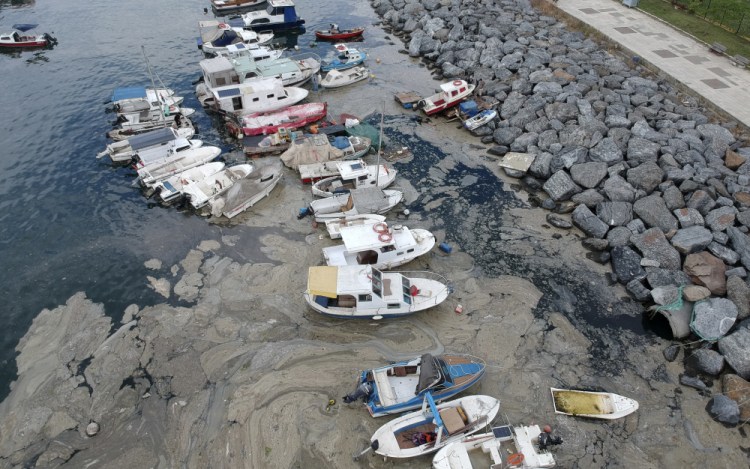Turkish president Recep Tayyip Erdoğan pledged Tuesday to rid the Sea of Marmara of the “scourge” of marine mucilage, as workers embarked on a massive effort to vacuum up the foul-looking substance that has been plaguing coastal communities.
Thick layers of the viscous, slimy mucus colloquially known as “sea snot” have been wreaking havoc along Turkey’s coastline for months, choking harbors and clogging up fishermen’s nets while suffocating marine life.
Scientists say that untreated sewage, agricultural runoff and other forms of pollution are responsible for the phenomenon, but that warming water temperatures caused by climate change appear to be making it even worse.
The unappetizing muck has become a source of national embarrassment and rising anger. On Tuesday, Erdoğan vowed to designate the Sea of Marmara, which is between the Black and Aegean Seas, as a conservation area. Meanwhile, government officials launched a massive cleanup operation, using tanker trucks with suction hoses that park along the shoreline and effectively act as giant vacuum cleaners. Similar methods have been used to remove toxic blue-green algae from waterways in Florida.
“My fear is, if this expands to Black Sea … the trouble will be enormous. We need to take this step without delay,” Erdoğan said, according to the BBC.
Turkey’s environment minister, Murat Kurum, said Tuesday that hundreds of workers would be deployed to every province that borders the Sea of Marmara in the largest marine cleanup effort that the country has ever seen. To prevent the problem from reoccurring, officials will take steps to reduce pollution and improve wastewater treatment, he said.
While some scientists applauded the plan, others said that the Turkish government should have cracked down on pollution decades ago.
The number of people living in Istanbul and other cities along the Sea of Marmara has exploded, marine biologist Mert Gökalp told Turkish newspaper Cumhuriyet. “Why did we go on with our lives without thinking about where our wastes go?”
Marine scientists have also warned that merely removing the top layer of “sea snot” will not solve the problem, because thick bands of mucus are floating below the water’s surface and settling on the sea floor, where they pose a hazard to coral and other marine life. It is not clear how the underwater mucus could be removed, but officials in Istanbul suggested last month that it might be necessary to bring in dredging boats.
The mucus that has been surrounding marinas and washing up on beaches in Turkey is secreted by phytoplankton populations that grow to out-of-control numbers when high levels of nitrogen and phosphorous upset the ocean’s ecological balance. Though the mucus itself is not necessarily dangerous, it can carry toxic microorganisms and dangerous bacteria such as E. coli, and authorities have warned against touching it.
Mucus removed from the Sea of Marmara will be trucked to waste disposal facilities, officials said, though some communities are experimenting with drying it out on land to see whether it can be used as a fertilizer or animal feed.
Send questions/comments to the editors.



Success. Please wait for the page to reload. If the page does not reload within 5 seconds, please refresh the page.
Enter your email and password to access comments.
Hi, to comment on stories you must . This profile is in addition to your subscription and website login.
Already have a commenting profile? .
Invalid username/password.
Please check your email to confirm and complete your registration.
Only subscribers are eligible to post comments. Please subscribe or login first for digital access. Here’s why.
Use the form below to reset your password. When you've submitted your account email, we will send an email with a reset code.